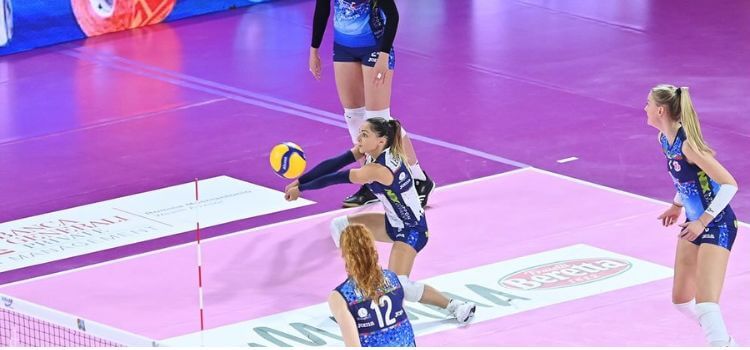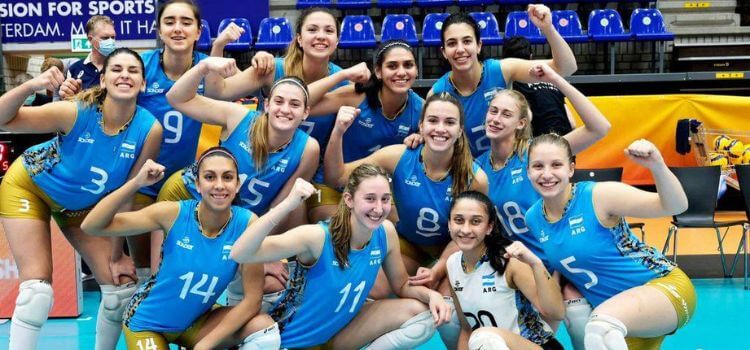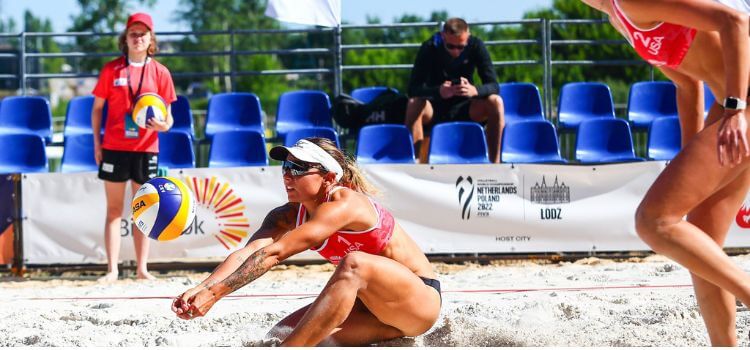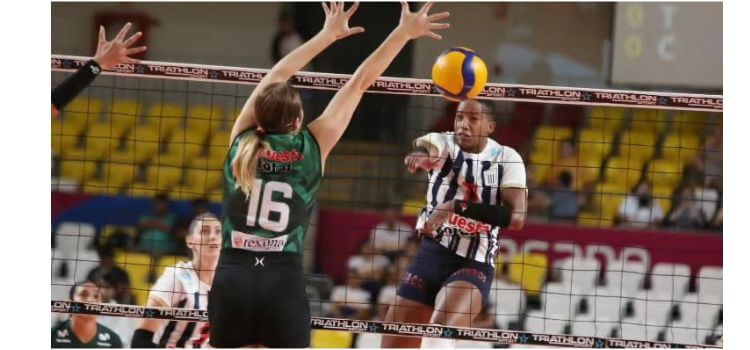As an Amazon Associate, I earn from qualifying purchases
Have you ever wondered if playing volleyball could change your body composition? Maybe you’ve heard people say that volleyball makes you thicker or more muscular. Let’s dive into this topic and explore Does Volleyball Make You Thicker?
Physical activity plays a crucial role in shaping our bodies, and understanding the specifics can help you set realistic expectations and goals.
Understanding Body Composition
Body composition refers to the proportion of fat, muscle, bone, and water in the body. It’s a more comprehensive measure than body weight alone.
When we talk about getting “thicker,” we typically refer to an increase in muscle mass, which can give the body a more defined and toned appearance.
The Role of Volleyball in Fitness
Volleyball is a dynamic and high-energy sport that requires quick movements, powerful jumps, and agile responses. These demands make it an excellent workout that engages multiple muscle groups and provides a comprehensive fitness routine.
Muscle Development Through Volleyball
How Volleyball Builds Muscle
Volleyball involves a lot of jumping, squatting, and quick directional changes, all of which are fantastic for muscle development. The repetitive nature of these movements helps in building and toning muscles, particularly in the legs and core.
Key Muscle Groups Engaged
Legs:
The constant jumping and lunging strengthen the quads, hamstrings, calves, and glutes.
Core:
Stability and balance are crucial in volleyball, engaging the abdominal and lower back muscles.
Upper Body:
Spiking, serving, and blocking work the shoulders, arms, and chest.
Impact on Lower Body
Leg Muscles and Their Development
Volleyball players often have well-developed leg muscles. The sport involves various lower body exercises like squats, lunges, and jumps, all of which contribute to stronger and thicker legs.
Exercises Targeting the Lower Body
Jumping: Enhances the strength and size of calf muscles and quads.
Lunging: Works on glutes, hamstrings, and quads.
Squatting: Builds overall leg strength and muscle mass.
Impact on Upper Body
Upper Body Strength and Muscle Gain
Although volleyball might not seem like an upper-body-intensive sport, it significantly impacts these muscles. Serving and spiking engage the shoulder muscles, while blocking and diving can work the chest and arms.
Volleyball Movements Enhancing Upper Body
Spiking: Strengthens the shoulder and arm muscles.
Serving: Works on the deltoids and triceps.
Blocking: Engages the chest and arm muscles.
Core Strength and Stability
Importance of Core Strength
A strong core is vital for stability and power in volleyball. It helps maintain balance and provides the necessary force for jumps and dives.
Core Exercises in Volleyball
Planks: Improve overall core strength.
Russian Twists: Enhance oblique muscles.
Leg Raises: Target the lower abdominal muscles.
Cardiovascular Benefits
Cardio Workout from Volleyball
Volleyball is not just about strength; it’s a great cardiovascular workout too. The quick sprints, jumps, and continuous movement keep your heart rate up, providing an excellent cardio session.
How Cardio Affects Body Composition
Cardio exercises burn calories, which can lead to fat loss. This, combined with muscle gain, results in a leaner and more toned physique.
Caloric Burn and Weight Management
Calories Burned During Volleyball
Playing volleyball can burn a significant amount of calories. On average, a person can burn between 300 to 500 calories per hour, depending on their weight and intensity of play.
Volleyball for Weight Loss or Maintenance
By burning calories and building muscle, volleyball can be an effective part of a weight loss or maintenance program. The muscle gain helps in increasing metabolism, aiding in more efficient calorie burning even at rest.
Volleyball and Fat Reduction
Fat Reduction Through Volleyball
Regularly playing volleyball helps reduce body fat. The high-intensity nature of the sport means you’re constantly moving, which helps in burning fat.
Long-Term Fat Loss Benefits
Consistent play over time can lead to sustained fat loss and a healthier body composition. The combination of cardio and strength training in volleyball is particularly effective for this.
Volleyball for Overall Health
Additional Health Benefits
Beyond body composition, volleyball offers numerous health benefits. It improves cardiovascular health, enhances coordination, and increases flexibility.
Mental Health Benefits
Playing volleyball also boosts mental health. The social aspect of the game can reduce stress and anxiety, and the physical activity releases endorphins, which are natural mood lifters.
Diet and Nutrition
Role of Nutrition
Nutrition plays a crucial role in achieving and maintaining the desired body composition. Proper fueling before and after games ensures optimal performance and recovery.
Nutritional Tips for Volleyball Players
Volleyball players require a well-balanced diet to maintain energy, build strength, and support recovery. Here are some nutritional tips tailored for volleyball athletes:
Rest and Recovery: Sleep and Nutrition
Why: Adequate sleep and proper nutrition are crucial for recovery and overall performance.
What to Focus On: Ensure a consistent sleep schedule and a balanced diet to support muscle recovery and immune function.
By following these nutritional guidelines, volleyball players can optimize their performance, stay energized, and recover effectively from training and matches.
Carbohydrates: Fuel for Energy
Why: Carbs are the primary source of energy for high-intensity sports like volleyball.
What to Eat: Whole grains (brown rice, quinoa, oats), fruits (bananas, berries), vegetables (sweet potatoes, spinach), and legumes (beans, lentils).
When: Focus on carb-rich meals and snacks before and after practice or games to replenish glycogen stores.
Protein: Building and Repairing Muscles
Why: Protein is essential for muscle repair and growth, especially after intense training.
What to Eat: Lean meats (chicken, turkey, fish), eggs, dairy products (Greek yogurt, cheese), plant-based sources (tofu, lentils, chickpeas), and protein shakes.
When: Aim to include protein in every meal, with a focus on post-workout recovery.
Fats: Essential for Endurance
Why: Healthy fats provide long-lasting energy and support overall health.
What to Eat: Avocados, nuts, seeds, olive oil, fatty fish (salmon, mackerel).
When: Incorporate healthy fats into meals, particularly during longer training days.
Hydration: Staying Fueled
Why: Proper hydration is crucial for maintaining performance and preventing cramps.
What to Drink: Water is essential, but during intense games, consider sports drinks to replenish electrolytes.
When: Hydrate throughout the day, not just during practice. Drink before, during, and after games.
Vitamins and Minerals: Supporting Overall Health
Why: Vitamins and minerals like calcium, iron, and magnesium are vital for muscle function and bone health.
What to Eat: Leafy greens (spinach, kale), dairy (milk, yogurt), nuts (almonds, walnuts), and fortified cereals.
When: Ensure a varied diet to cover your micronutrient needs, or consider a multivitamin if necessary.
Pre-Game Nutrition: Fueling Up
Why: Eating the right foods before a game ensures you have the energy to perform at your best.
What to Eat: A balanced meal with carbs, protein, and fats 3-4 hours before the game (e.g., grilled chicken with brown rice and vegetables). A light snack (banana, energy bar) 30-60 minutes before the game.
When: Timing is key. Avoid heavy meals right before playing to prevent sluggishness.
Post-Game Recovery: Refueling
Why: Post-game nutrition helps with muscle recovery and replenishing glycogen stores.
What to Eat: A combination of carbs and protein within 30 minutes after the game (e.g., a protein shake with fruit, chocolate milk, or a turkey sandwich).
When: The sooner, the better for optimal recovery.
Snacking: Keeping Energy Levels Steady
Why: Healthy snacks keep energy levels up during long tournaments or training sessions.
What to Eat: Trail mix, energy bars, yogurt with granola, fruit smoothies, or peanut butter on whole-grain toast.
When: Snack between meals or during breaks in tournaments.

Supplements: Consider with Care
Why: Supplements can help fill nutritional gaps but should not replace a balanced diet.
What to Take: Protein powder, BCAAs (branched-chain amino acids), multivitamins, or omega-3 supplements.
When: Only consider supplements if dietary needs aren’t fully met, and consult with a nutritionist or healthcare provider.
Volleyball Training Programs
Types of Volleyball Training Programs
There are various training programs tailored to improve specific skills in volleyball, such as strength training, agility drills, and endurance exercises.
Read More Best Used Volleyball Training Equipment
Benefits of Structured Training
A structured training program can help maximize the benefits of playing volleyball by focusing on different aspects of fitness, ensuring a well-rounded workout.
Read More Volleyball Training Equipment
Common Myths About Volleyball and Body Size
Debunking Myths
One common myth is that volleyball makes you bulky or overly muscular. In reality, it helps in achieving a balanced and toned physique.
Clarifying Misconceptions
Volleyball primarily builds lean muscle and improves overall body composition without necessarily making you “thicker” in a negative sense.
Conclusion
In summary, volleyball is an excellent sport for improving body composition. It helps in building lean muscle, burning fat, and enhancing overall fitness.
The physical and mental health benefits make it a worthwhile activity for anyone looking to improve their body and mind. So, grab a ball, hit the court, and enjoy the game while getting fitter!
FAQs
Does playing volleyball increase body weight?
Playing volleyball can increase muscle mass, which might reflect as weight gain on the scale. However, this is usually lean muscle weight, not fat.
How long does it take to see changes in body composition from playing volleyball?
Visible changes in body composition can take a few weeks to a few months, depending on the frequency and intensity of your volleyball sessions, along with your diet and overall lifestyle.
Can volleyball help in losing belly fat?
Yes, volleyball’s cardio and core-strengthening exercises can help reduce belly fat over time.
Is volleyball better than gym workouts for muscle building?
Volleyball offers a full-body workout and can be as effective as gym workouts for muscle building, especially for the legs, core, and upper body.
What should I eat before and after a volleyball game?
Before a game, eat a balanced meal with carbs and protein. After a game, focus on protein-rich foods to aid muscle recovery and replenish energy.


